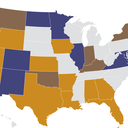New laws in 19 states will make it harder to vote in 2022

Your ability to vote in 2022 will largely depend on where you live, as lawmakers in 25 states have made it easier for people to vote while those in at least 19 states have made it more difficult, per the Brennan Center for Justice.
Why it matters: The new laws are likely to make the disparities between states even greater. The states where voting is already difficult have been the ones to enact stricter laws; those where it is easier to vote have expanded access to the ballot box.
- For example, 17 of 25 states that have enacted expansive voting laws in 2021 did not also enact restrictive legislation.
- This is based on data as recent as Sept. 27, but most legislative sessions are over for the year, so we likely won't see any significant voting laws introduced or passed through the end of 2021.
What to watch: Federal voting rights legislation to address this dynamic has been stuck in Congress, caught between Democrats who want to expand voting access and Republicans who are more concerned about preventing fraud.
The big picture: There were a number of changes to the way we vote in 2020 after the coronavirus pandemic altered our way of life.
- Measures like curbside voting, no-excuse early voting, and expanded mail-in balloting were implemented in response to the pandemic.
- Eight states have either extended or permanently implemented expansive voting policies from 2020.
- Other states (New York, Connecticut and Washington) have moved to restore the right to vote to people with past convictions.
Between the lines: In the states where voting restrictions have been enacted, lawmakers have imposed measures like stricter voter ID laws, limited the number of ballot drop boxes, and made it more difficult to vote early or by mail.
- A new trend that has emerged in at least four states so far is criminal voting laws — imposing harsh criminal penalties on voters or election officials who do things like hand out water to people waiting in line (Georgia) or returning a ballot for someone with a disability who couldn’t otherwise do it themselves (Iowa and Kansas).
- And in Texas, elections officials who encourage voters to request mail ballots can face criminal charges.
The bottom line: Voter turnout reached its highest level in a century during last year's presidential election — but the fallout from that election is also what has inspired these new voting laws across the country.
Editor's note: The map with this story has been corrected to note that Colorado expanded voting rights, rather than restricting and expanding them.